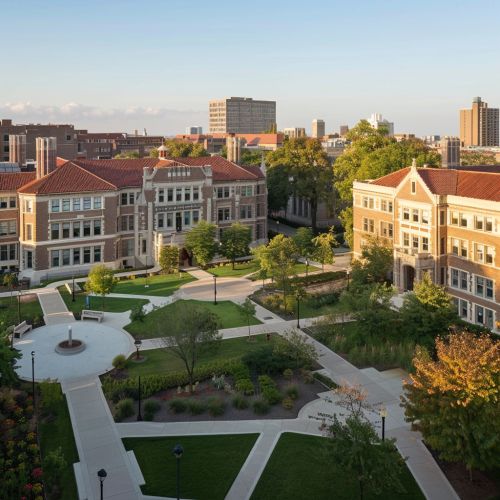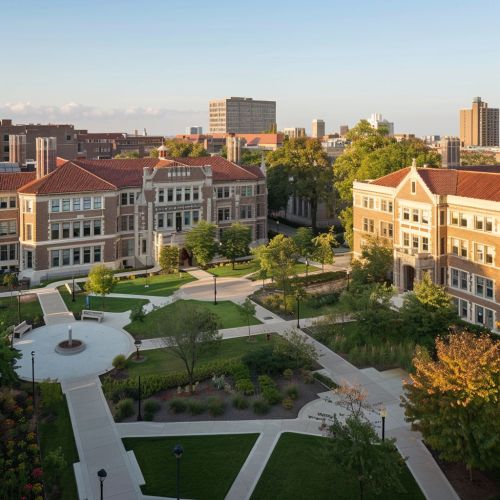University of Chicago Laboratory Schools: Difference between revisions
(Created page with "== History == The University of Chicago Laboratory Schools, commonly referred to as Lab Schools, were founded in 1896 by John Dewey, a prominent American philosopher and educator. Dewey's vision was to create an educational environment that emphasized experiential learning and progressive education principles. The schools were initially established as a laboratory for the Department of Pedagogy at the University of Chicago, allowing for the practical application and...") |
No edit summary |
||
| Line 13: | Line 13: | ||
* **Earl Shapiro Hall**: Designed for early childhood education, serving nursery through second grade. | * **Earl Shapiro Hall**: Designed for early childhood education, serving nursery through second grade. | ||
[[Image:Detail-97067.jpg|thumb|center|The University of Chicago Laboratory Schools campus, featuring several buildings and green spaces.|class=only_on_mobile]] | |||
[[Image:Detail-97068.jpg|thumb|center|The University of Chicago Laboratory Schools campus, featuring several buildings and green spaces.|class=only_on_desktop]] | |||
== Academic Programs == | == Academic Programs == | ||
Latest revision as of 03:00, 19 July 2024
History
The University of Chicago Laboratory Schools, commonly referred to as Lab Schools, were founded in 1896 by John Dewey, a prominent American philosopher and educator. Dewey's vision was to create an educational environment that emphasized experiential learning and progressive education principles. The schools were initially established as a laboratory for the Department of Pedagogy at the University of Chicago, allowing for the practical application and testing of educational theories.
Educational Philosophy
The educational philosophy of the Lab Schools is deeply rooted in Dewey's principles of progressive education. This approach emphasizes the importance of learning through experience, critical thinking, and the development of problem-solving skills. The curriculum is designed to be student-centered, encouraging active participation and collaboration among students. The schools aim to foster a love of learning and intellectual curiosity, preparing students for lifelong learning and responsible citizenship.
Campus and Facilities
The Lab Schools are located on the University of Chicago campus in the Hyde Park neighborhood of Chicago, Illinois. The campus includes several buildings, each designed to support the unique educational needs of different age groups. Key facilities include:
- **Blaine Hall**: Houses classrooms for lower school students.
- **Judith and John McCarter Junior High School**: Dedicated to middle school students.
- **Gordon Parks Arts Hall**: A state-of-the-art facility for visual and performing arts.
- **Earl Shapiro Hall**: Designed for early childhood education, serving nursery through second grade.


Academic Programs
The Lab Schools offer a comprehensive curriculum that spans from nursery school through high school. The academic programs are designed to challenge students intellectually while providing a supportive and nurturing environment. Key components of the curriculum include:
Early Childhood Education
The early childhood program focuses on the developmental needs of young children, emphasizing play-based learning and social-emotional development. The curriculum includes activities that promote language development, motor skills, and early literacy.
Lower School
The lower school program (grades 1-5) builds on the foundation established in early childhood education. Students engage in a variety of subjects, including mathematics, science, language arts, and social studies. The curriculum is designed to foster critical thinking and problem-solving skills.
Middle School
The middle school program (grades 6-8) introduces students to more advanced concepts in core subjects while encouraging exploration in the arts and humanities. The curriculum includes interdisciplinary projects that promote collaboration and creativity.
High School
The high school program (grades 9-12) offers a rigorous academic curriculum that prepares students for college and beyond. Students have the opportunity to take advanced placement (AP) courses, participate in research projects, and engage in extracurricular activities. The high school also emphasizes community service and leadership development.
Extracurricular Activities
The Lab Schools offer a wide range of extracurricular activities to complement the academic curriculum. These activities provide students with opportunities to explore their interests, develop new skills, and build lasting friendships. Key extracurricular programs include:
- **Athletics**: The Lab Schools have a strong athletics program, offering sports such as basketball, soccer, swimming, and track and field.
- **Arts**: Students can participate in visual arts, theater, music, and dance programs. The Gordon Parks Arts Hall provides state-of-the-art facilities for these activities.
- **Clubs and Organizations**: There are numerous student-led clubs and organizations, including debate, robotics, and environmental clubs.
Notable Alumni
The Lab Schools have a long history of producing distinguished alumni who have made significant contributions in various fields. Some notable alumni include:
- **Edwin Hubble**: Renowned astronomer known for his discovery of the expanding universe.
- **Kurt Vonnegut**: Acclaimed author known for his works of fiction, including "Slaughterhouse-Five."
- **David Axelrod**: Political consultant and former senior advisor to President Barack Obama.
Governance and Administration
The Lab Schools are governed by a Board of Directors, which includes representatives from the University of Chicago, parents, and community members. The Board is responsible for setting policy and overseeing the overall direction of the schools. The day-to-day administration is managed by the Director of Schools, who works closely with faculty and staff to ensure the effective operation of the schools.
Research and Innovation
As a laboratory school, the Lab Schools are committed to research and innovation in education. Faculty members collaborate with researchers from the University of Chicago and other institutions to develop and test new educational methods and practices. This research informs the curriculum and teaching practices at the Lab Schools, ensuring that they remain at the forefront of educational innovation.
Community Engagement
The Lab Schools are deeply committed to community engagement and service. Students are encouraged to participate in community service projects and initiatives that promote social responsibility and civic engagement. The schools also collaborate with local organizations and community groups to address pressing social issues and support the well-being of the Hyde Park community.
See Also
References
- Dewey, John. "The School and Society." University of Chicago Press, 1899.
- Cremin, Lawrence A. "The Transformation of the School: Progressivism in American Education, 1876-1957." Vintage Books, 1961.
- Tanner, Laurel N. "Dewey's Laboratory School: Lessons for Today." Teachers College Press, 1997.
